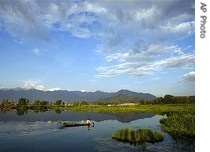2007年VOA标准英语-With Conflict Ebbing, Kashmir Turns Attention t(在线收听)
Srinagar
27 June 2007
Kashmir has had its share of turmoil in the past two decades as Indian army troops have clashed with militants allegedly backed by neighboring Pakistan. But as the conflict seems to be ebbing, many Kashmiris are turning their attention to environmental issues, which were neglected during the fighting. High on their agenda is cleaning up the pollution in Dal Lake, as Raymond Thibodeaux reports from Srinagar, the capital of Indian-controlled Kashmir.
 |
| A Kashmiri boatman paddles his boat in marshland, once part of the famous Dal Lake, in Srinagar India, Wednesday, 7 June 2007 |
In the 30 years since, the number of people living in houseboats on Dal Lake has quadrupled to more than 60,000. And over the past few years, nearly a quarter million tourists have come annually to stay on the lake.
More people, more pollution.
Shaffat Syed heads Global Green Peace, a local private agency trying to clean up Dal Lake. He says the surge of population on the lake and in the surrounding city of Srinagar has hurt the lake.
SYED: "Ten years back everybody in Srinagar used fish (from the lake), even the vegetables. And even people used to wash their hands and drink water from the lake. But now, as you see the evidence of waterborne diseases like hepatitis and all that is growing. I don't think I'm too foolish to do that."
THIBODEAUX: You would not eat fish?
SYED: "No, I don't think so because I don't know what I am eating."
The lake is littered with plastic bags, empty soda bottles and broken flip-flops - the trash from Srinagar's bustling street markets and tourist boats. But environmental experts say the biggest problem is sewage, thousands of tons of it flowing into the lake every day.
Much of it is untreated human waste from the houseboats, houses and hotels that is dumped into the lake. The result is an explosion in algae and other plants that rob the lake of oxygen. The oxygen is needed to support aquatic life.
Analysts say that, in some parts of the lake, levels of fecal coliform, a potentially deadly bacterium, are well above what the World Health Organization considers safe for swimming.
Irshad Khan is the director of Kashmir state's forest ministry, which monitors the health of the region's lakes and rivers. He says the state's sewage treatment facilities are inadequate for the nearly one million people who live in Srinagar.
"This is a major problem here, in fact," Irshad said. "The Kashmir Valley does not have a well-planned, well-laid sewerage system. So entire waste water, domestic particularly, is being discharged into the rivers and lakes. In the Dal Lake in Srinagar, most of the sewage of the city or waste water is being discharged into it. Now, a few treatment plants have been set up here and there, three or four, but still the problem remains."
Building more sewage treatment plants was part of a $150 million government program launched in 2005 to clean up Dal Lake. The plan also included relocating scores of small factories and hundreds of families living on illegal landfills around the lake, who authorities say are responsible for dumping tons of trash and sewage.
So far, the plan has not had much success, largely because of a separatist insurgency that has wracked Kashmir for two decades. In the past few years, peace efforts have eased the fighting and now authorities here want to revive plans to save the lake.
That is good news to Syed at Global Green Peace.
"If we leave it as it is and the problem starts aggravating, aggravating, aggravating, a time will come when it will be a point of no return for this lake. Because if population keeps on going up and up inside the lake, (and) then if we will not manage tourism inside the lake, we do not manage our houseboats, we do not manage the waste coming out the houseboats and hotels and other things on the peripheries, definitely the effect will be on this lake," Sayed said.
Many Kashmiris feel the same way. Some are taking matters into their own hands. Recently, more than 50 volunteers gathered to collect garbage from Dal Lake. Environmental activists here say they hope to see more volunteer projects to clean up the lake. Waiting for the government to do it, they say, could take a while.